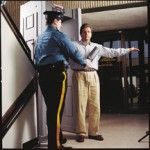The Naked Truth: National Security and Civil Liberties

The trees are bare, it’s dark by about 4:45 p.m. and I’ve had to write 11 different essays in the last week. You know what that means: we’re over halfway through the semester, and it’s just about time for Thanksgiving break.
Within days, many of us will hop into shuttles, cabs or cars driven by friends we’ve bribed with cookies, heading for SYR and a flight bearing us to a relaxing week at home. Yet before you even set eyes on your plane, some Transportation Security Administration officer’s eyes will be roving your naked body as you pass through Homeland Security’s latest effort to keep us safe: the backscatter X-ray/millimeter-wave scan.
Similar to the machine used to check on a broken bone, these scanners reveal what’s underneath your clothing, ostensibly to see whether you’re hiding a bomb in those sweatpants of yours. Yet this gives a complete stranger an eyeful – and who’s to say that person operating the machine isn’t ogling you or making crude comparisons? Not to say that all TSA officers are pervs, but you have to admit, some are out there.
Uncomfortable having an image of your naked self on display for some random government-funded airport security official? That’s fine – a TSA officer will be happy to give you a full-body pat-down – groin and all. And if you care not to submit to what is otherwise classified as sexual assault so you can board a plane, then prepare to pay an $11,000 fine and fight a civil lawsuit. The government has now declared that once begun, a passenger must complete the security process.
They claim that a potential terrorist with a bomb in his underwear could opt out on the feigned basis of discomfort, but then seek a different point of entry, where perhaps he would not be selected to go through this rigorous and invasive screening.
Seems like a silly concern, doesn’t it? The scan lasts perhaps seven seconds at the most, and then you’re free to board your flight. And maybe it is silly; maybe the idea of some TSA officer getting a look at your privates or running a hand by your crotch doesn’t bother you like it does me. I’ll admit, I’m more buttoned up than most.
But why do we need to implement this policy? In the near-decade since the tragedy of 9/11, we have had not one single instance of a foiled terrorist plot on an airline that originated domestically. In the wake of the attacks, passengers foiled the shoe bomber’s attempt at bringing down a plane, and we implemented the simple practice of removing one’s shoes when going through security. The Christmas underwear bomber boarded his flight abroad, in Amsterdam. It is a testament to the security measures we have instituted since 9/11 that such an attack has not occurred again. And if the government has uncovered viable plots only preventable by these intrusive scans, officials have disclosed nothing. Thus, I am left to conclude that what we have works – so why invade our privacy to this extent?
Moreover, using national security as a pretext for naked scans or full-body pat-downs starts the slide down the slippery slope of government intrusion into our personal lives. Who’s to say we stop there? Why not require individuals to disclose their phone records, emails and bank statements? If we’re willing to say the government has the power to see what’s under our clothing, isn’t it less invasive just to see whom we’re calling or where we spend our money? All in the name of national security, of course.
That’s exactly how a democratic society degenerates into a socialist one. We vote away our rights and freedoms because we’re afraid, and we grant the government the power to do whatever it takes to make us feel safe (which is not the same as actually being safe – they can’t make that guarantee). In this case, that fear takes the shape of a terrorist hijacking an airplane – and for the record, they have won when they scare us into relinquishing the freedom we Americans hold so dear.
Yet we can also argue that, in the interest of the safety, security and health of all citizens, the government has a duty to provide healthcare, or to regulate commerce to such an extent that we cannot freely purchase what we so desire (to wit: regulations on what may be sold in vending machines). When we start to scale back the limitations we impose on government in the interest of security, we grant it the potential to take over our power to make decisions, to live our lives as we see fit.
Melodramatic? Perhaps. But maybe you’ll understand just how far this new procedure goes when you’re getting to second base with a TSA agent.








